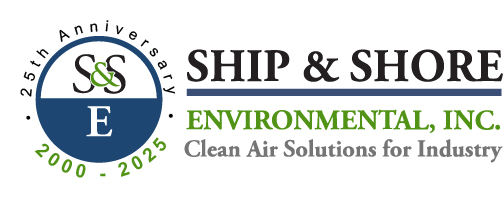Metal Coil Coating Operation
June 6, 2013 6:38 pmHistory:
An industrial metal coil coating operation in Southern California region desires to reduce operating costs related to their process equipment. Their process includes a metal coil cleaning and coating line with drying ovens as permitted by SCAQMD.
The client utilizes a recuperative thermal oxidizer for air pollution abatement from their process, which consumes a large amount of natural gas annually. The recuperative oxidizer design utilizes a shell and tube heat exchanger for heat recovery. However, the recuperative thermal oxidizer is a large consumer of natural gas for operation. Therefore, the customer asked Ship & Shore Environmental to assist them with evaluation of potential energy saving strategies to determine the best way to improve the thermal efficiency of the recuperative thermal oxidizer.
After careful review of the process and recuperative thermal oxidizer, an energy-efficient regenerative thermal oxidizer (RTO) was selected as a potential replacement for the existing recuperative thermal oxidizer.
Solution:
Installation of a new regenerative thermal oxidizer (RTO) greatly reduced their natural gas consumption. This reduction in operating fuel (natural gas) for the oxidizer was due primarily to technology improvements that have been developed over the last 10-15 years in the field of thermal oxidation.
The Ship & Shore RTO design provided for approximately 95% heat recovery with built-in heat exchange chambers that utilize a structured ceramic thermal media for heat recovery. The resulting improved thermal efficiency of the RTO, when compared to a recuperative thermal oxidizer, provided for a substantial decrease in demand for natural gas due to thermal oxidation.
The RTO along with other process improvements have resulted in a net decrease of VOC emissions. This was due to improved VOC collection efficiency and reduced energy requirements of the new RTO.
The RTO system is designed to process 7,000 scfm of VOC-laden air. It utilizes a 2.4 MM BTU/hr burner which operates at approximately <0.2 MM BTU/hr during normal conditions.
Project pay back:
Our sales team and engineers were instrumental in convincing the local utility provider to qualify the customer for an incentive/rebate for the project. Much to the surprise of the customer the RTO project was approved for an impressive incentive of $120,000.
In addition, the project pay back will exceed the capital investment in a short time. Due to the high energy-efficiency of the RTO, annual reduction in natural gas consumption is expected to be more than 190,000 therms per year.
Tags: RTOCategorised in: Case Study & White Papers

